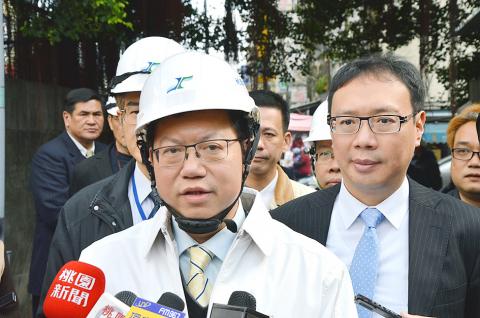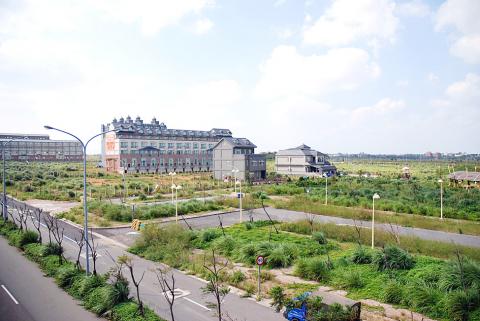Amid allegations of misuse of public funds and illegally favoring specific groups, Taoyuan Mayor Cheng Wen-tsan (鄭文燦) yesterday said he would hand over all information relating to the Taoyuan Aerotropolis project to the Ministry of Justice’s Agency Against Corruption (AAC) for investigation.
“The city’s new administration team has simplified and limited the operations of the Taoyuan Aerotropolis Corp (桃園航空城公司) to investment promotion and marketing only,” Cheng said in a Facebook post. “All jobs and duties that should be under the city government’s control will be returned to the city and handled by its bureaus. It would be a return to the normal process of policy execution and allow the project to be supervised publicly by elected representatives on the city council.”
Cheng said he had asked Deputy Mayor Chiu Tai-san (邱太三) to set up a task force composed of different local government bureaus — including budget, accounting and statistics, finance, economic development and civil service ethics — to oversee the special investigation of the aerotropolis firm.

Photo: Hsieh Wu-hsiung, Taipei Times
Project documents will first be organized and reviewed by the task force before they are forwarded to the AAC for investigation, Cheng said.
“Only when Taoyuan has the courage to correct previous mistakes can it march forward into a new beginning,” he said.
Asked whether the move would mean suspending or mothballing the project completely, Chiu answered in the negative.

Photo: Huang Yi-pi, Taipei Times
“The project consists of many parts and only those found to be problematic will be investigated and halted,” he said.
To address questions about the project’s opaque operations and functions, Chiu said: “It will be carried out according to five major principles, as the mayor has insisted: transparency, democratic participation, green economics, public interest and industry investment.”
“The corporation’s operation will be restricted to what was originally called for. That would place the rest of the business, including land appropriation, back in the hands of the city government so it can be publicly overseen by the city council,” he added.
The Taiwan Association for Human Rights welcomed the mayor’s action, and said it hoped the mayor would live up to the promise he made during his election campaign that he would place the whole project under investigation, especially in regards to “allegations of land speculation and insider trading even before the project had taken shape.”
Chiu said the city government welcomes any person or group to file complaints about what they consider illicit or to take legal action against suspected corruption.
Chien Chien-jung (錢建榮), a Taoyuan District Court judge who has long questioned the project’s necessity, criticized Cheng on Tuesday, saying that the mayor’s comment on “rebuilding the project from scratch after completely demolishing it” was nothing but “empty words.”
Calling for a “demolition and nothing more,” Chien wrote in a letter published by a local publication that neither Taoyuan nor Taiwan needs such a project, which has from the outset been synonymous with land speculation and collusion between government officials and the business sector.
“Mayor Cheng should easily see it now with the internal information available to him,” he added.
The city government released a statement on the same day rebutting Chien’s accusation that what Cheng has done is simply to “have a different group of people lining their pockets” with the project.
“The mayor has prohibited all first-level city officials and members of the core team, including himself, from purchasing land other than that for primary residence,” the statement said, adding that execution of the project would now be in the hands of the city government and thus be properly supervised.

SECURITY: As China is ‘reshaping’ Hong Kong’s population, Taiwan must raise the eligibility threshold for applications from Hong Kongers, Chiu Chui-cheng said When Hong Kong and Macau citizens apply for residency in Taiwan, it would be under a new category that includes a “national security observation period,” Mainland Affairs Council (MAC) Minister Chiu Chui-cheng (邱垂正) said yesterday. President William Lai (賴清德) on March 13 announced 17 strategies to counter China’s aggression toward Taiwan, including incorporating national security considerations into the review process for residency applications from Hong Kong and Macau citizens. The situation in Hong Kong is constantly changing, Chiu said to media yesterday on the sidelines of the Taipei Technology Run hosted by the Taipei Neihu Technology Park Development Association. With

A US Marine Corps regiment equipped with Naval Strike Missiles (NSM) is set to participate in the upcoming Balikatan 25 exercise in the Luzon Strait, marking the system’s first-ever deployment in the Philippines. US and Philippine officials have separately confirmed that the Navy Marine Expeditionary Ship Interdiction System (NMESIS) — the mobile launch platform for the Naval Strike Missile — would take part in the joint exercise. The missiles are being deployed to “a strategic first island chain chokepoint” in the waters between Taiwan proper and the Philippines, US-based Naval News reported. “The Luzon Strait and Bashi Channel represent a critical access

‘FORM OF PROTEST’: The German Institute Taipei said it was ‘shocked’ to see Nazi symbolism used in connection with political aims as it condemned the incident Sung Chien-liang (宋建樑), who led efforts to recall Democratic Progressive Party (DPP) Legislator Lee Kun-cheng (李坤城), was released on bail of NT$80,000 yesterday amid an outcry over a Nazi armband he wore to questioning the night before. Sung arrived at the New Taipei City District Prosecutors’ Office for questioning in a recall petition forgery case on Tuesday night wearing a red armband bearing a swastika, carrying a copy of Adolf Hitler’s Mein Kampf and giving a Nazi salute. Sung left the building at 1:15am without the armband and apparently covering the book with a coat. This is a serious international scandal and Chinese

COUNTERINTELLIGENCE TRAINING: The ministry said 87.5 percent of the apprehended Chinese agents were reported by service members they tried to lure into becoming spies Taiwanese organized crime, illegal money lenders, temples and civic groups are complicit in Beijing’s infiltration of the armed forces, the Ministry of National Defense (MND) said in a report yesterday. Retired service members who had been turned to Beijing’s cause mainly relied on those channels to infiltrate the Taiwanese military, according to the report to be submitted to lawmakers ahead of tomorrow’s hearing on Chinese espionage in the military. Chinese intelligence typically used blackmail, Internet-based communications, bribery or debts to loan sharks to leverage active service personnel to do its bidding, it said. China’s main goals are to collect intelligence, and develop a